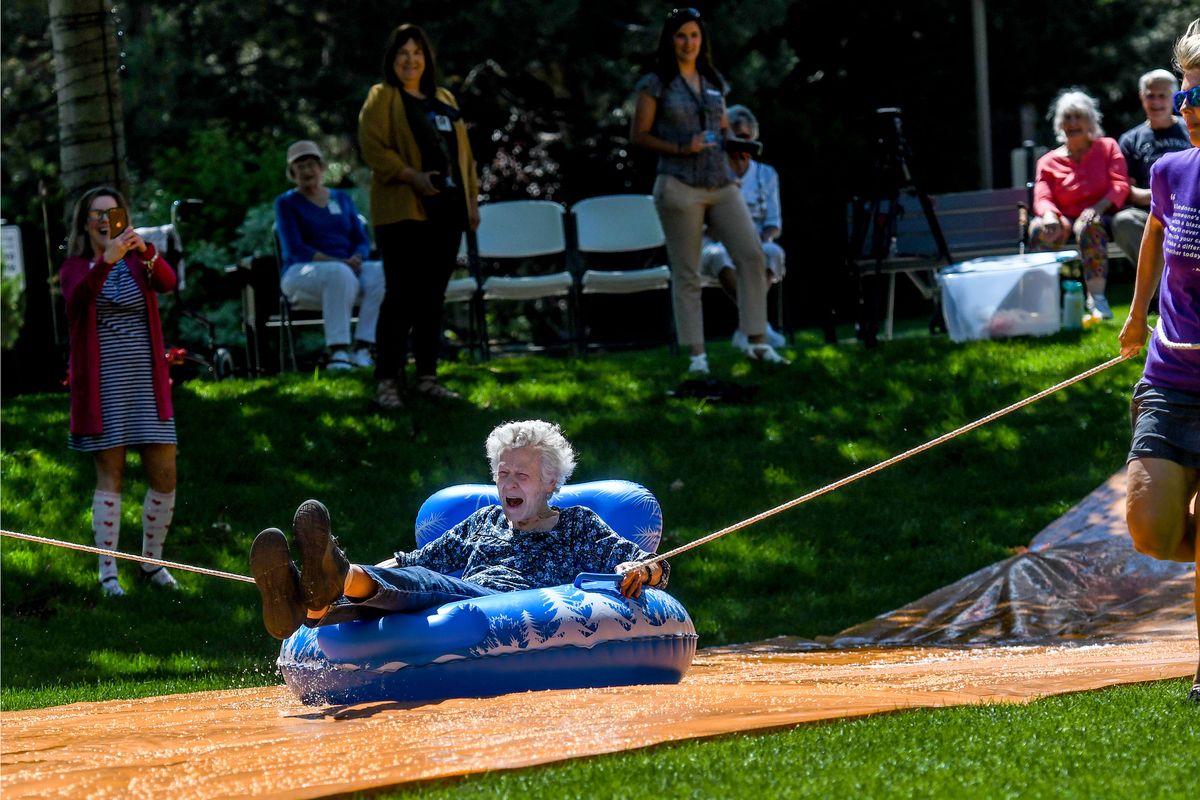‘It keeps you happy’: Spokane retirement community slips, slides and splashes for Alzheimer’s awareness

Taking a running leap, a smiling 82-year-old David Haugen launched himself belly-first, arms spread, down a sunlit orange slide Thursday. Water and suds doused the retirement community tenant as his fellow residents and their families cheered.
It did not take long for the idea of a slip-and-slide day on the grassy front lawn of Touchmark on South Hill to catch on, said Brittany Holden, Touchmark’s life enrichment director. After a year of staying indoors, residents told her about their excitement almost immediately, she said.
“The Slip-n-Slide here is great for the mind and body, and it’s really great for the neural plasticity of the brain,” Holden said.
The event is part of a weeklong fundraising effort by Holden and her event planning team for awareness about Alzheimer’s disease, which affected 5.8 million people in 2020, according to data from the Centers for Disease Control & Prevention. That number is expected to triple by 2060, according to the CDC.
The fundraiser, called “The Longest Day,” can include many events and ways for outreach, Holden said. For the slip-and-slide day, Touchmark staff set up an Alzheimer’s disease fundraising station near the front, with free ice cream and water balloons close by.
“There are a lot of ways you can do this Longest Day week, and we wanted this one to be more fun,” Holden said. “But it really does affect so many people, which is why we do encourage donations for research. It’s hard on caregivers and it’s hard on their families.”
Haugen has lost several of his friends to the cognitive decline caused by Alzheimer’s, he said.
“You know, one day you’re laughing and joking and having complicated conversations that can have double meanings in them,” he said. “Then maybe a few months go by, and you have to speak more concretely. You can’t joke as often. Then one day, they don’t communicate at all. You find them staring blankly at a wall, not knowing who their own spouse is. It really has changed my perspective.”
He said he wants to normalize the discussion around Alzheimer’s, and the slide was a more casual way to start that discussion. In his six years at Touchmark, Haugen cannot recall an event as popular or communal.
“There is something a bit off about seeing someone walk up to the slide with the help of a walker and then get into an inner tube,” Haugen said. “And yet, there’s something so right about that.”
David Williams, 80, was the first resident to take on the sudsy slide. At 2 p.m. sharp, Williams launched himself down with the help of Touchmark staff, who carried ropes on either side of the bright blue tube.
Williams said he went because he believes physical activity is the key to mental strength.
“It keeps you happy,” Williams said. “They’re after us all the time to have fun, I guess.”
As he said this, a grinning Williams grabbed two water balloons and hurled them at two staff members, who laughed with him.
One resident, 90-year-old Pat Phillips, said she went down the slide because her two granddaughters persuaded her. Having been at Touchmark for eight years, Phillips said she enjoyed the chance to get outside after a year indoors.
“I really love it here, but this was nice because we do not have a lot of things like this,” Phillips said.
Alexis Crellin, fitness professional at Touchmark, said the slide was a bigger hit than she expected.
“We were thinking, it would be awesome if we get five people down the slide,” she said. “At this point, I think there have been 15 or 20.”
Although no cure or proven method of slowing Alzheimer’s exists yet, people can reduce risk factors through physical activity, healthy diets and cognitive training, according to a report from the National Institute on Aging as part of the U.S. Department of Health & Human Services.
Holden said she kept this in mind while planning for the week, which will include art and other skill-building programs.
“Almost everyone here has someone in their life who they’re connected to who is living with Alzheimer’s,” she said. “We’re hoping by having a weeklong conversation like this, the folks will be able to talk to their friends and loved ones about this and how it affects their lives.”